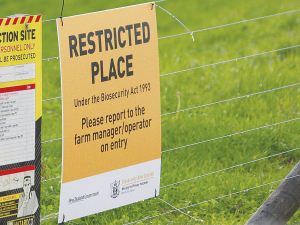NZ winegrowers advance vineyard biosecurity in 2025
The year was marked by “progress, collaboration and reflection” in biosecurity, says New Zealand Winegrowers Biosecurity Advisor Jim Herdman.
 Four years into the attempt to eradicate M. bovis from New Zealand, only one infected property remains in the country.
Four years into the attempt to eradicate M. bovis from New Zealand, only one infected property remains in the country.
Four years into a world-first attempt to eradicate Mycoplasma bovis (M. bovis), agreed jointly between the Government and farming sector groups, just one infected property remains in New Zealand.
Prime Minister Jacinda Ardern and Agriculture Minister Damien O’Connor marked the milestone at the national bulk milk testing lab MilkTestNZ in Waikato today alongside eradication partners DairyNZ and Beef + Lamb NZ.
“When we took our one shot to eradicate we did so to protect our national herd from a painful disease, our economy from a sharp shock, and our rural communities from widespread anxiety,” Ardern said.
She said that partnership with the primary sector was critical.
“No one in the world had attempted to eradicate M. bovis before, and if we were going to try something that had never been done, we needed to do so together.
“I want to acknowledge how tough it’s been for those farmers who have lost their herds and stock genetics built up over decades. Your action has preserved our productive sectors that underpin the prosperity of all New Zealanders.”
Damien O’Connor said no working farms are currently confirmed infected and the one remaining infected property is a large beef feed-lot, with careful planning under way to start clearing it later this year.
“Though we can’t rule out occasional finds elsewhere, we think it’s the right time to consider the future framework for the M. bovis Eradication Programme,” O’Connor said.
He said partners, including the Ministry for Primary Industries, are working on a transition of the M. bovis Eradication Plan to an agency under a National Pest Management Plan and will provide O’Connor with a proposal for consideration.
The plan, he said, will take into account what works for farmers and will be available for public consultation in the second half of 2022, with implementation set to begin in 2023.
“We are at an important juncture. We are aiming to move from delimiting – controlling the last known pockets of the disease – to provisional absence. This will be followed by significant surveillance testing of herds around the country to provide assurance there are no undetected pockets of disease.
“Our world class bulk milk testing and beef herd surveillance developed over the past four years will continue to be crucial tools.”
DairyNZ chairman Jim van der Poel said a lot was owed to farmers for their efforts in eradicating M. bovis and the robust biosecurity practices on-farm, which continues to be important.
“This programme has at times been challenging for farmers and it’s important we acknowledge that. That work means we are now on a clear path to eradication and this transition will help maintain that status.
“To protect the sacrifices and investment made, it’s important our farmers continue to manage their herds well, particularly through the national animal tracing system (NAIT). We’ve come a long way and what we are doing here is watched and discussed by other farming countries,” Van der Poel said.
Beef + Lamb New Zealand chairman Andrew Morrison said it was committed to ensuring the pest management programme worked for farmers.
“Farmers will remain at the centre of our work because without them we can’t get to the point of proven absence of the disease. We will also maintain close governance oversight of the programme in the transition to an agency.
“We really want to hear from farmers during their consultation later this year.
“I encourage farmers to ensure they know where their cattle are coming from, to record movements and to have good on-farm biosecurity practices,” Morrison said.
Budou are being picked now in Bridge Pā, the most intense and exciting time of the year for the Greencollar team – and the harvest of the finest eating grapes is weeks earlier than expected.
The Real Estate Institute of New Zealand (REINZ) has released its latest rural property report, providing a detailed view of New Zealand’s rural real estate market for the 12 months ending December 2025.
Rural retailer Farmlands has released it's latest round of half-year results, labeling it as evidence that its five-year strategy is delivering on financial performance and better value for members.
OPINION: "We are back to where we were a year ago," according to a leading banking analyst in the UK, referring to US president Donald Trump's latest imposition of a global 10% tariff on all exports into the US.
DairyNZ says the Government’s proposed Resource Management Act reform needs further work to ensure it delivers on its intent.
Overseas Trade Minister Todd McClay says he's working constructively with the Labour Party in the hope they will endorse the free trade agreement (FTA) with India when the agreement comes before Parliament for ratification.

OPINION: A mate of yours truly reckons rural Manawatu families are the latest to suffer under what he calls the…
OPINION: If old Winston Peters thinks building trade relations with new nations, such as India, isn't a necessary investment in…